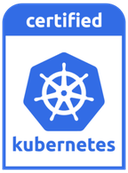mirror of
https://github.com/puppetmaster/typhoon.git
synced 2025-10-03 14:24:37 +02:00
* Fix the last minor issue for Fedora CoreOS clusters to pass CNCF's Kubernetes conformance tests * Kubelet supports a seldom used feature `kubectl logs --limit-bytes=N` to trim a log stream to a desired length. Kubelet handles this in the CRI driver. The Kubelet docker shim only supports the limit bytes feature when Docker is configured with the default `json-file` logging driver * CNCF conformance tests started requiring limit-bytes be supported, indirectly forcing the log driver choice until either the Kubelet or the conformance tests are fixed * Fedora CoreOS defaults Docker to use `journald` (desired). For now, as a workaround to offer conformant clusters, the log driver can be set back to `json-file`. RHEL CoreOS likely won't have noticed the non-conformance since its using crio runtime * https://github.com/kubernetes/kubernetes/issues/86367 Note: When upstream has a fix, the aim is to drop the docker config override and use the journald default
Typhoon 
Typhoon is a minimal and free Kubernetes distribution.
- Minimal, stable base Kubernetes distribution
- Declarative infrastructure and configuration
- Free (freedom and cost) and privacy-respecting
- Practical for labs, datacenters, and clouds
Typhoon distributes upstream Kubernetes, architectural conventions, and cluster addons, much like a GNU/Linux distribution provides the Linux kernel and userspace components.
Features 
- Kubernetes v1.17.3 (upstream)
- Single or multi-master, Calico or flannel networking
- On-cluster etcd with TLS, RBAC-enabled, network policy
- Advanced features like worker pools, preemptible workers, and snippets customization
- Ready for Ingress, Prometheus, Grafana, and other optional addons
Docs
Please see the official docs and the Google Cloud tutorial.